The Becoming series started in 2019. We wanted to hear from women in different walks of life and how they were approaching creativity, career goals, and more–mostly the WHY and HOW beneath it all. It’s been amazing to conduct these interviews and get a “behind the scenes” look at so many inspirational women. You can see them all here. Now, let’s hear from my childhood idol, my best friend (I’ve told her this and am still waiting for confirmation if I’m allowed to) and I can’t believe I get to say this, Mary Engelbreit.
I’m thrilled to share an interview with the legendary artist, Mary Engelbreit, founder of the eponymous brand. Mary Engelbreit is a renowned American artist and illustrator celebrated for her distinctive, whimsical style that has captivated fans for decades. Her artwork often features warm, nostalgic imagery, with charming characters, intricate patterns, and uplifting messages that resonate with a broad audience. Engelbreit’s signature “Mother Goose” and “Queen of Everything” series became iconic, solidifying her place in the world of art and design.
In addition to her success as an illustrator, Engelbreit has expanded her brand into home décor, greeting cards, calendars, and more, making her a household name. Her work reflects a love for family, tradition, and the simple joys of life, embodying a timeless appeal that continues to inspire and delight people around the world.
On a personal note, Mary Engelbreit was everything to me as a child. I collected her products–everything from nightgowns to ball caps to hair clips. I even met her at the grand opening of her Costa Mesa store where she signed by Christmas stocking. One of the greatest joys in my life has been connecting with her as an adult where she participated in our craft-along not once, but twice. Today’s interview is a career highlight!
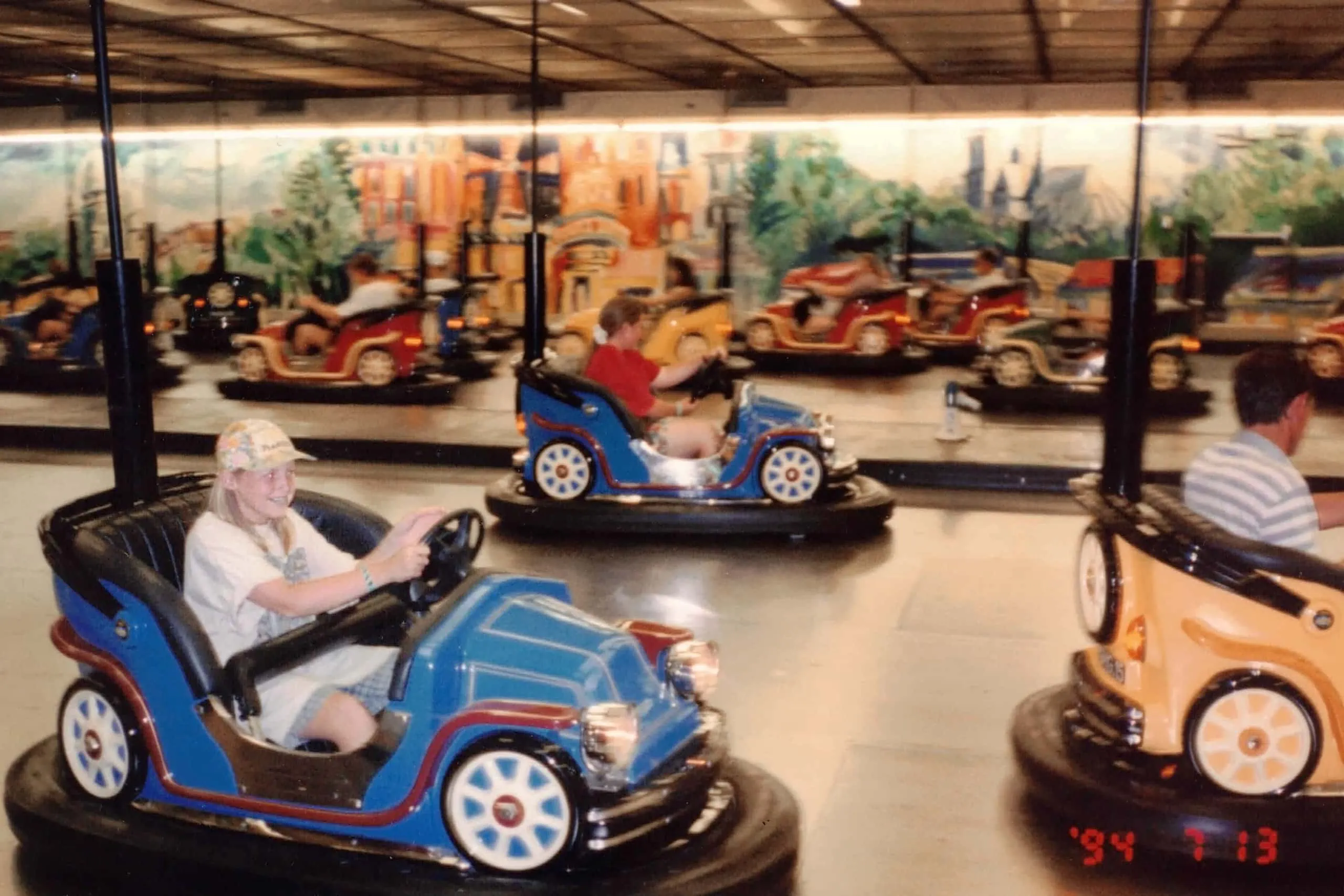
This interview was different from our normal series in that I got to call Mary and have a chat on the phone. Some words have been edited for clarity.
If someone didn’t know who you were, what would you tell them that you do?
I usually just say I’m an artist and I illustrate children’s books and calendars and things like that.
You were everything to me in the 90’s. That was such an impressionable time for me. Would you consider that the golden age?
Yeah. We were just talking about it the other day. Certainly the golden age of licensing, definitely. Licensing was very different back then. There was a lot of it. You would license with a manufacturer and they would distribute everything. Now, you have to find the store first who wants your stuff, and then approach a manufacturer — they don’t sell it. You know so, it’s just flipped, it’s totally flipped. But back then, oh my gosh, of course it was new on the marketplace and we just had so many licenses. It was great, it was fun.
How did it start?
My idea was to have a greeting card company. Which we started and we ran out of my basement. And we decided to go to the stationery show, and we only had — it may have been 20 cards, maybe. We just went and set up a card table and put these 12 cards on the card table. And we got so much positive reaction, and New York Magazine came through and photographed it and put it in their next issue. Which really — if that hadn’t happened, I’m not sure where we would be doing this now. But that did happen, and also we approached by a couple of agents at that show. And several people came up and said can we license your art for a calendar for picture frames or something. And we were like “sure!” — we didn’t know what licensing was. So we quickly looked it up, found out what that involved. So we really learned on the go about licensing.
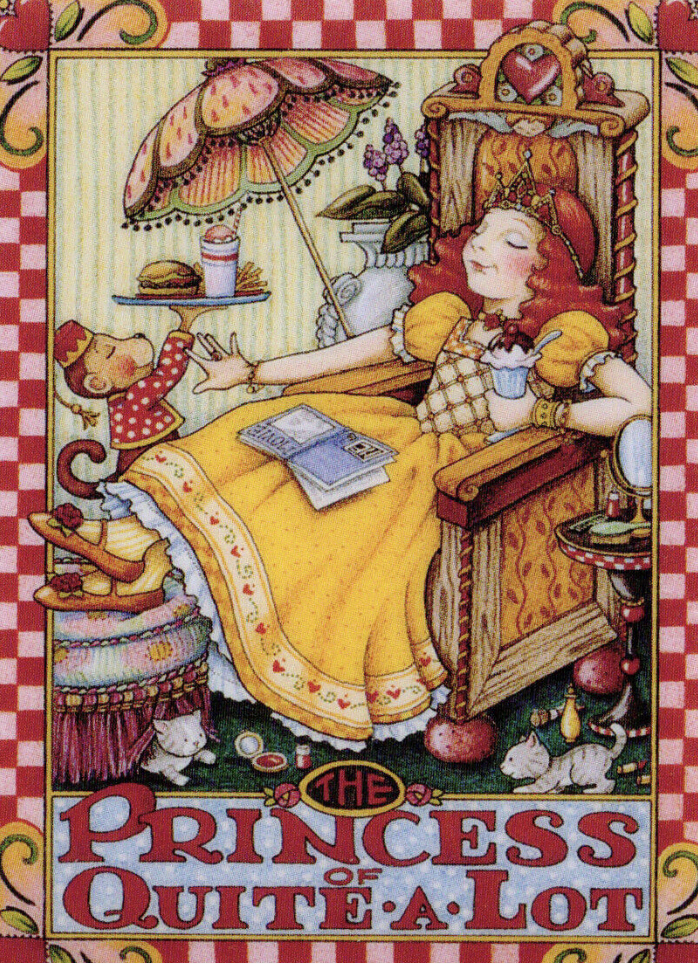
What influenced you as an artist?
My mother read to us every night and she had a lot of books from her childhood and from her mother’s childhood — so really beautiful illustrated books. And you know I would copy the illustrations and I was constantly drawing the stories that she read so. That’s what I wanted to do from when I was really young.
Did your mom give you encouragement in that way or was it just something that came natural and you just kinda did it?
I just kinda did it but they were very encouraging both my mother and father. And even my sister was encouraging. I remember one night my mother called us up and said “Mary, come down” and set the table and my sister said, “I’ll do it Mary’s drawing.” So they were all just so supportive and always had art supplies around the house and I think I took a few art lessons too, from neighborhood teachers and things. And it was just, that’s what I did, and they appreciated it and encouraged me every step of the way.
What gave you the motivation to keep going with it, or do it professionally?
I wasn’t good at anything else, and I couldn’t imagine that — I just had no interest in working in an office you know, doing anything. That’s just, all I wanted to do was draw. And then I got a job, one of my first jobs was at an art supply store; it was a big art supply store here in town. So I met all these working artists that would come in and get their supplies and I realized that you could make a living doing this and so it never occurred to me, actually, to do anything else.
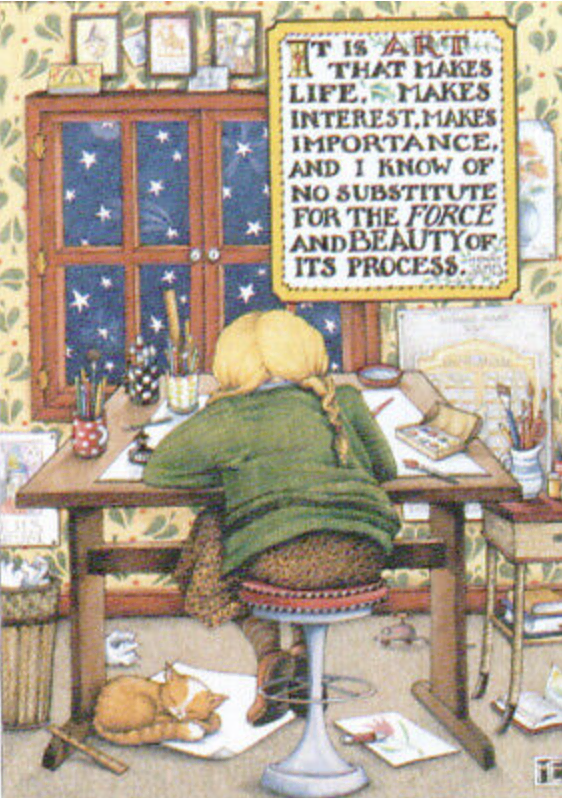
At some point you did adopt instagram and had such a personal take on it — to my knowledge you don’t have anyone else do it. What sparked that, ‘I’m just gonna do it and I’m gonna share’, verses having somebody else run it for you?
This was a long time ago, and we did hire a marketing company and they were running it. And I didn’t really know anything about instagram and I went to my son who was working at the company and I said this can’t go on. These posts are nothing like I wanna post. I would never say that, I don’t ever want to sell, sell, sell. You know I have other things we could show, I think we should just show art. So I took it over and I’ve been doing it ever since. I really like it, I like to do it.
Politically — well first, before this even happened I had drawn a love is love drawing in support of the LBGTQ movement, but that got little blowback but not much. But then Michael Brown died here in St. Louis who was shot by that police — that and I published a hands up don’t shoot drawing, and that just got a lot of attention. Since the instagram account was so personal and I felt very strongly about that; so that was part of me and I thought well I’m just gonna publish it and then see what happens. If they don’t like it they don’t like, we’ll go out of business.
The blowback was so awful. That day that I published it we lost, I can’t remember, but I think it was like you know 20,000 followers and I’m watching this happen and I’m thinking well I just ruined 20 years of work here. Everybody’s gonna have to go find other jobs. And but the end of the day we had gained 100,000 followers — not 100,000, I can’t remember but we had gained a ton of followers. And I thought well you know I guess they can take it. And I didn’t do it all the time, I only did it when something really affected me and put it in there.
And now I think of course the politics are so important. So important. You know to vote and you know make changes. I just would never not comment on it. I would never just pretend like everything was going on as usual and we’re gonna you know sell these cute little cards and not mention it. I couldn’t do it. I perfectly understand why people do do it. I mean it’s insane to do what I do actually. It’s crazy if you’ve got a business and you certainly can’t do it if you’re working with other people. But it’s my business and all of our licenses seem to be fine with it.
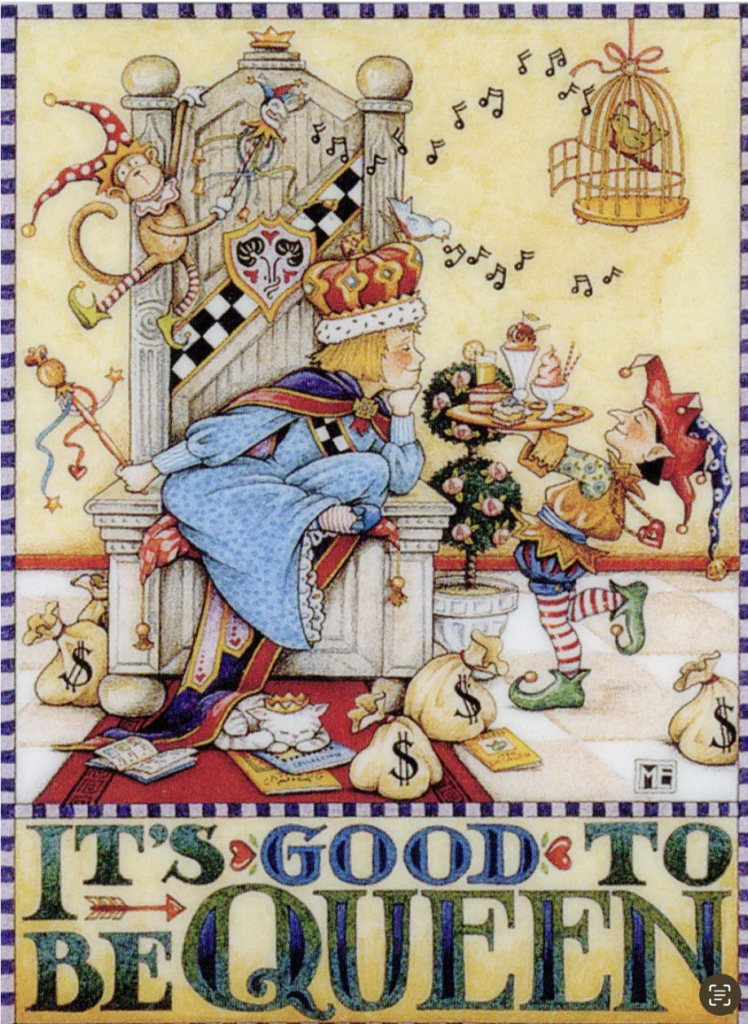
So you lost lots of followers but did you see it affect sales in any way?
They went up.
Where did that sense of empathy, sense of compassion, sense of sharing that important message come from? I know a lot of artists do have that sense of empathy for other people but they may not necessarily act on it — where does that come from?
Yeah and I’m not saying — I don’t think everybody should act on it. I definitely don’t want to give that impression that you should. But I don’t know, things affect me. Unfair things bother me. And when they’re trying to legislate unfair things and there’s a chance to do something about it you know. Because of how strongly I feel, to be silent about it would be not honest. So you know it’s just the way I feel about.
Switching gears a bit and going back to what I consider the golden time when you were on my radar, you were my everything, you were my world. I know I’m not alone in that. If somebody sees you on the street and is like oh my gosh you’re Mary Englebreit — what are they saying to you?
A lot of them say what you just said, their parents had my stuff in their house or you know they read The Night Before Christmas every year. And it’s always nice to hear that because you know I’m up in studio here all by myself and drawing and just crammed away to my little office. So it’s nice to hear that the stuff gets out there in the world and people like it and have always liked it. It’s nice.
Do you feel any pressure, either artistically or personally when you hear that type of feedback? Does it make you feel like you have to do something or stay in a certain lane?
No, I think I’ve blown that with the political stuff. You know I just draw stuff that I like and I am thinking about you know how is somebody going to use this, what would their kids like to see while they’re reading this book. So I am thinking about what I think they would like but you can never tell what they’re gonna like. As a matter of fact they joke at the office that if I like a product, we can pretty much guarantee its not gonna sell. So you never know what they’re gonna go for so I just draw what I like and what I think it should look like.
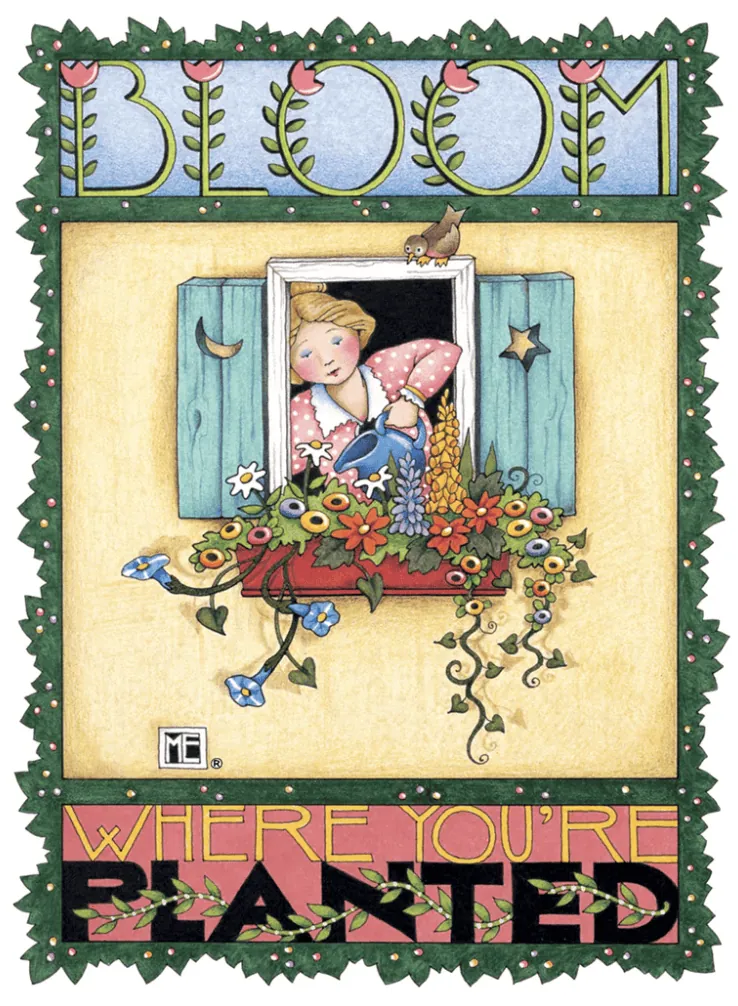
What’s one project that you’re particularly proud of and why?
You know my favorite book that I’ve done is Mother Goose. I’m really happy with the way it turned out and I know a lot of people have used it over the years. I love that book. I loved doing it and I love the way it turned out.
And then The Night Before Christmas was another book that — although now when I look at it I think oh I would change this or I would change that. I don’t feel like that about Mother Goose, I like it all but still The Night Before Christmas was a really nice project and that’s been out there forever.
Where do you find your inspiration? Because you’re the most prolific artist I know. You’re constantly putting things out there, you’re making all the time. Where do you find it?
I don’t know, because it is constant. I get really antsy if I’m not making something or drawing or having a project and it seems to have gotten worse — or I don’t know if it’s a good thing or a bad thing, with the pandemic you know and we were stuck at home. There wasn’t a lot else to do and I just really started producing a lot of stuff. Kind of horrifyingly I did not have to go out once for any art supplies I had so much stuff here. What was that, two years? And I got by fine without ever buying a pencil. But I don’t know it’s the one thing that makes me feel fulfilled I guess and happy, is making something.
Do you have creative friends that influence your work?
Oh yeah I’ve got so many, so many creative friends. And I’m inspired by not necessarily exactly what they do, because it’s so individual, but just the fact that they do it. We all like to get together and compare projects and what are we doing, what’s coming up next and what are we doing. I just like to see everyone’s work.
Do you have a formal avenue to do this or is it just like, casual get togethers?
Casual get togethers. As a matter of fact I’m having some friends next weekend come into town, just 3 or 4 friends and we’re all just gonna sit around and make stuff. So, yeah, it’ll be fun.
Are there any artists or creatives you look up to historically or present? Maybe not in your friend group, or can be I guess.
Well of course I was very influenced by Ellie Olde, Jesse Wilcox Smith and people like that. Also Joan Walsh England, I felt about her I guess the way you felt about me. I bought every book that she put out and I would copy her drawings and I loved it when it started appearing on other things you could buy; dolls and prints and things like that. And then I got to know her later, we showed her the magazine and we became friends. So she was a great inspiration to me how she ran a business and how she felt about drawing. Another person I really admire is William Joyce, Bill Joyce who did Roly Poly Oly and Bob the Dinosaur and all those great movies and books. And I loved the way he was just so excited about everything he draws you know he’s so passionate about it and it shows in everything he does and I really admire that.
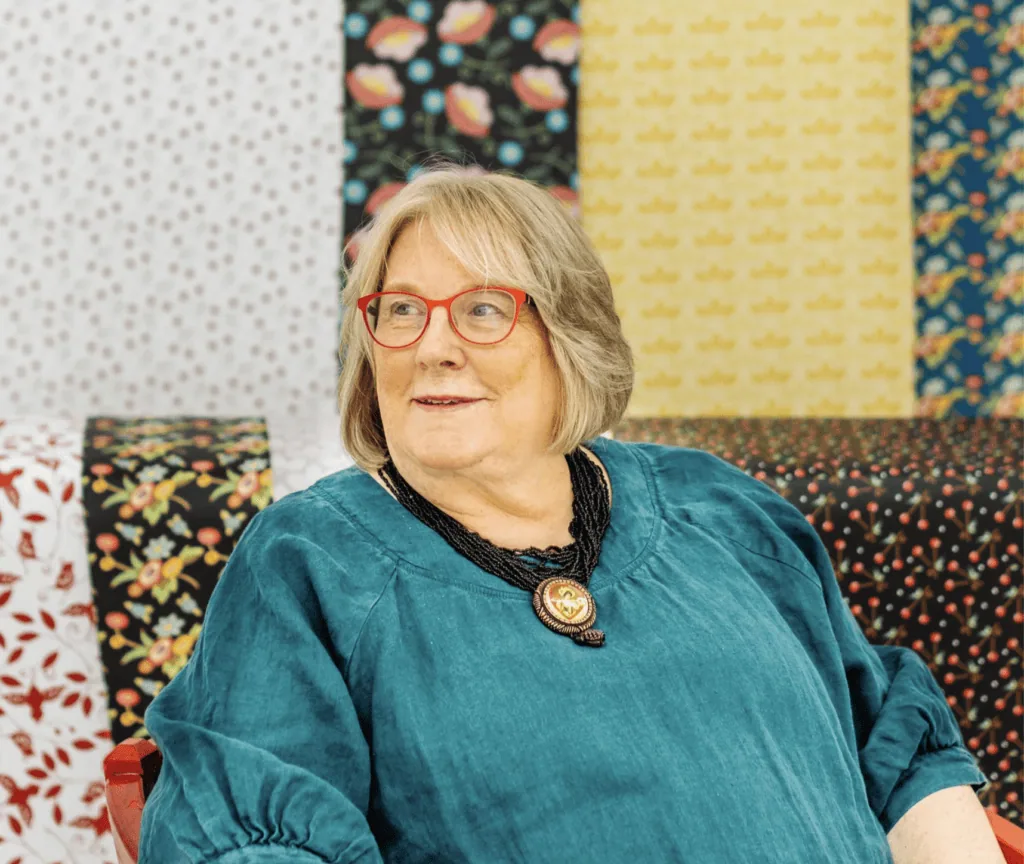
What are three words that describe you?
Me? I don’t know. Deeply sarcastic. I don’t know. Kind of driven, where the artist’s concerned I guess. I don’t know.
The way you talked about William Joyce, like he was so enthusiastic, I was wondering what the similarities were there or why you were drawn to that.
Well I do feel like that. He has a much better platform than I do, he makes movies and you know all that kind of thing, has won Oscars. But I do feel that way about my art you know I am really excited about it and I like to show it to people and get reactions and see how they feel about it. Yeah, so I am like that I guess.
On that line, are there any books or movies or shows or music that excite you right now?
I just read a couple of really good books, one was called — haha I forget. Townslake I think, I think that’s what it was called. And the other one was Hey Beautiful. I think one was Ann Patchet, but I listen to books on tape when I’m coloring. Well I guess they’re not books on tape, it’s audible books. A little more modern than books on tape.
I’m a big fan of movies, especially now that you can get them in your home while you’re lying around in your pajamas. I just like to see anything new. Especially anything visual that’s new. I love fashion — you would never know it — but I love looking at it and reading about it. Anything visual like that is something that I can’t get enough of. And that’s one of the reasons I like instagram, although instagram is changing a little bit. Not so much [inaudible] stuff if you ask me. Pinterest, I get stuck on Pinterest just looking at all this fabulous stuff you know that’s out there in the world. It’s wonderful.
There’s the Ezra Kline podcast, he’s an opinion writer at the New York Times. He just had a podcast about taste and its really interesting cause a guy gets on and he talks about how the algorithm is making it so we’re just consuming the same. We’re not getting outside of our box because the algorithm is really making us view the same things over and over. It’s finding our tastes and then just going into that so that we don’t get outside of it.
It’s so frustrating.
Yeah, those are a lot of my frustrations with where it’s gone. I mean I have a lot of frustrations with it, but I think you’ll really appreciate his thoughts there, it’s really interesting. I think it’s called the Ezra Kline show maybe, I’ll email it to you.
Yeah it’s very frustrating that they do that and you just start seeing the same thing over and over. Not even everybody you’re following, they don’t even show you everybody you’re following. It’s so annoying and you have to go look for them
What’s one piece of advice that has carried you through? And who was it from?
My father told me one time — he was very funny but he was kind of a quiet guy and I knew that he was very proud that I was doing this business and he just didn’t say much. And one time we were all out for dinner and I was talking about this electric art table that I wanted to get that was incredibly expensive, especially for me at the time — but you know you didn’t have to do that hand crank thing and all that. And he said ‘you are an artist’, which I was floored because at the time I wasn’t really calling myself that. And he said ‘You’re an artist and should have the best materials that you need to do that. This is what you’ve decided to do and you need to get whatever you need to make it happen.’ It was powerful advice but also just powerful just because it was coming from him who didn’t really lean towards saying things like that.
That’s actually really interesting. I was doing what I do, which I didn’t really know at the time. I was making blog posts and making projects and posting them. When we moved here from Copenhagen I was looking for a full time job because my husband was going to school and I was just hustling I was working on my blog and I was starting to make some money on it but I really needed a full time job to support us. I got three job offers and they didn’t work out for whatever reason and my dad says to me, “It looks like its working out for you.” And I remember thinking that’s like all I needed to hear, was like some sort of validation or approval because I wasn’t going to work on it full time but all of a sudden I hear my dad say it who’s really focused on finances. And it was like oh maybe I should do this, and so it was kind of like okay then let’s do it.
Yeah it’s very powerful coming from somebody you love like that and also somebody you know who’s a little bit skeptical. You know one of my parents when I said I wanted to be an artist they were like, “oh! Okay…”. But neither one of them thought — I’m sure they were thinking how in the heck is she gonna make any money doing that.
Well you said driven was one of your words, you must’ve shown that in some way where they thought oh you can actually make this happen.
They did. They did. They never ever, they never said you know you can’t do that there’s no money in it. Which I’ve heard a lot of people say their parents said to them which is just so sad. They never ever said that, they just said okay! You know, see where it goes. So I never felt anybody telling me, there was nobody telling me you can’t do this, which is nice.
And maybe this question, maybe you just answered this, but I talked about a piece of advice that carried you. Is there a comment or critique that maybe, that motivated you, where you were like ‘I’ll show you’. Something where you took that criticism and did something with it?
Well, probably the political stuff. People said you know you’re nuts for doing that with you’re business, it’s crazy when you run a business [and] you’re driving away half the population. It’s very sad that it’s half the population but I didn’t really care about that. No, I don’t think anybody ever, aside from that, nobody’s ever really said anything that made me wanna do anything differently.
What’s a typical day like for you?
I don’t — because of my foot — I’m not out and about very often. So really I’m working most of the time. Once in awhile my husband and I will take a drive or do something like that, but honestly I’m here a lot and then I go into the office for meetings a few days a week. And that’s about it. I draw. I make stuff. All day.
Have you ever been in a creative slump?
Oh sure, yeah. Not lately, but yes I definitely have been.
What do you do?
It wasn’t such a problem, I can’t imagine — I hope it doesn’t happen now that I’m kind of stuck here. We’d go on a trip or we’d visit friends. There was always something else to do. I never worried about because I knew it would come back, so I’ve looked at it as kind of an opportunity to do something else, which I never felt like doing when I was in the mood to draw. So I kind of looked at it as a positive thing.
Was there one skill you wish you would’ve learned when you were younger?
Yeah, I wish I had learned to paint. You know I wish I had maybe branched out a little bit more with my art.
When you say paint, what specifically?
Like watercolor, I don’t know how to do that. You know but that’s — it’s too late now. I’m fine with what I know how to do. But that would’ve been fun to do something a little but different I think sometime.
Is there a dream project that you would still like to do?
Yeah, well this is just happening now. Do you know John Pavolovitz? I follow him on Instagram and we started communicating. I don’t think he’s still a pastor but he was, and he writes beautiful books. I’m not religious at all but he is a very spiritual person and really writes some beautiful things. We were communicating through instagram and i asked him if he’d ever written a children’s book. And he hadn’t but said he would be interested so he’s written it and it’s really wonderful and I’m gonna illustrate that. So I’m looking forward to that.
Very cool, that’s very exciting. I wrote a question to see if I could catch you off guard I wrote, “Who is your best friend?”
Well, obviously it’s you.
You got the question right. But really, who is your best friend. I’m curious.
I have a lot of best friends. I have to have friends from when I was in kindergarten. I have a lot of different groups of friends and they’ve all met each other one way or the other. But they are what keeps me going. We just have so much fun. Even if we aren’t seeing each other regularly; a lot of people have moved away. Still they’re very close, even if we haven’t seen each other for awhile you just pick it right up on email or on the phone. It’s really really important to me my friends.
This last question — the genesis of this interview series came after reading Michelle Obama’s Becoming book, like how did you become who you are. I’m curious, is there anything else you would like to become?
I’m pretty happy with the way things are. You know I’ve got these grandchildren that are so fun.
How many grandchildren do you have?
Two. All girls. Two and Four. And we have so much fun.
What do you do with them?
The older one the four year old is really into drawing. For Christmas she asked for lots of jewelry and things to decorate the house with. And the little one is just the sweetest thing in the world. But yeah I mean, I’m pretty happy. Both my kids are nearby. My daughter’s gonna be married next year so we’re planning that. So, it’s a really fun life. It’s a full life and I’m happy the way it is.
Thank you, Mary, for joining me in this chat. What an honor to have you here!
You can read more Becoming interviews here.


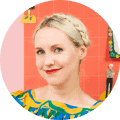
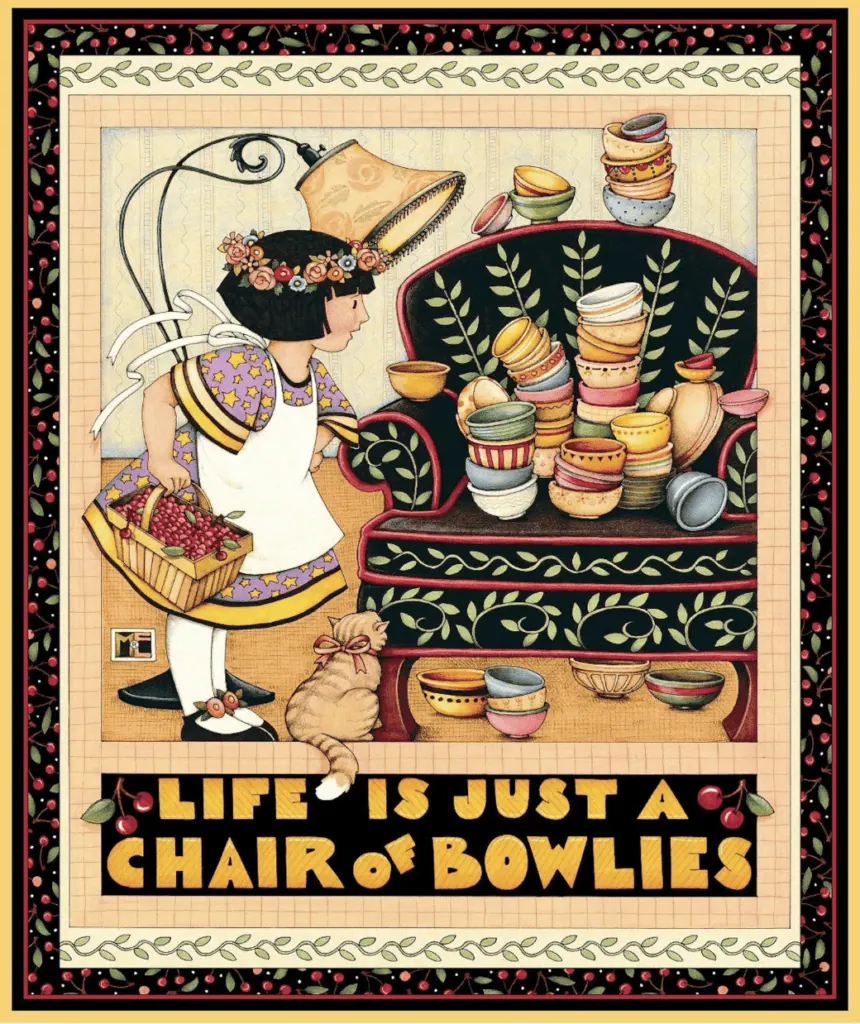
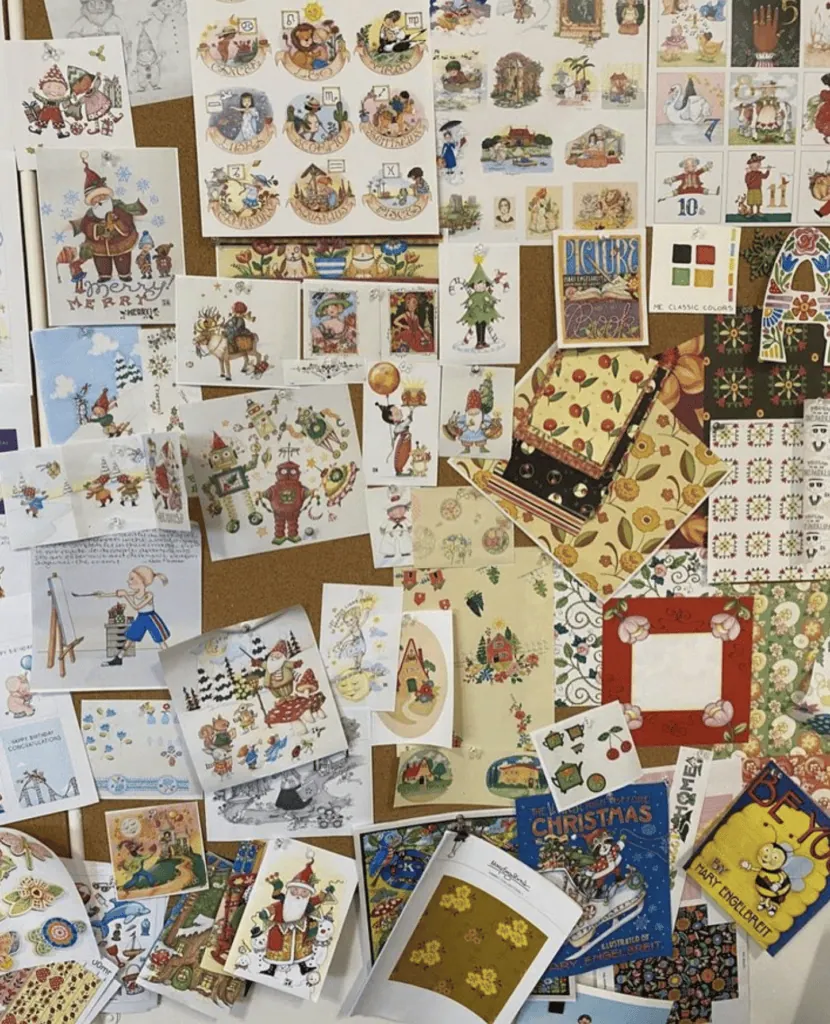
Comments